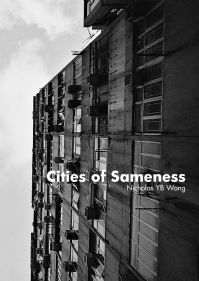|
by Michael Tsang

Nicholas YB Wong, Cities of Sameness, Desperanto, 2012. 103 pgs.
Cities of Sameness is a debut not to be missed. Nicholas YB Wong's first collection of poetry reminded me of the statue of David, carefully sculpted with no fat. Wong's poems feature meticulous diction, effective line breaks and well balanced stanzas, all embellished with creative explorations of poetic acoustics and aesthetics. Many of the pieces in Cities challenge ideals, assumptions and narratives about love, sexuality and human life, by urging the reader to observe and confront the politics of sameness and difference, particularly how they intersect in subjective perception and objective material reality or in conflicts between, for instance, homo- and heterosexuality or China and Hong Kong. Even its very title is designed to suggest the themes of variation and similarity through the oxymoronic juxtaposition of "sameness" and the plural "cities." "Foreign Exchange," the stunning opening poem to part one, "The City of Queers," explicitly details the "inconvenient truth" about gay sex tourism in Asia to engage themes of racial inequality in the context of the capitalist commodification of the developing world. In the piece, a British tourist visits child prostitutes in Cambodia every year, sucking "nothing but the third-world juice with their white lips." One such boy is "fondled […] like a dildo in a cheap hotel bed, in which dignity is dust" and is "crushed by the shrewd British pounds." In this exchange of money for service, both the boy's and tourist's eyes are "blinded by the dollar sign." By discussing gay sex tourism, the poem offers a twist on similar explorations of sexual exploitation in the region, which often focus on heterosexual sex. Here the differences between "gay" and "straight" are collapsed, the poem using sex tourism as a case to illustrate that "sameness" exists between both gays and straights when it comes to exploitation. I had the honour to hear Wong read "Foreign Exchange" at a recent poetry event in Hong Kong. As he read the first words, "[h]is right nipple smells like his left nipple," some of the audience, consisting of well-dressed Western and Chinese poets, professors and students, began to eye each other uncomfortably and continued to do so throughout the reading but nonetheless clapped politely when he finished. I could not help but wonder how many of the frowns were caused by the explicit eroticism of the poem and how many by the taboo subject of gay sex. Would the poem have caused a different reaction had it described a poor little girl being "rolled over by a hairy bear born to break bones"? Another outstanding poem, "A Night in Room 928," examines distance and intimacy between two people. The two, who could be either gay or straight, check into a love hotel "for its queen-sized bed" that "has been unmade by different faces, our bodies/not brand new." These lines can be read several ways. Has the couple previously had sex, "their bodies not brand new," or as "different faces" suggests, are they new lovers engaged in an act which is somehow familiar, "not brand new"? In the post-coital moment, the speaker of the poem "sits afar," observing the partner's sleep and wondering about the untold secrets between them. The narrator concludes that "Reality only shows; it never be./Like the beddings, the mattress. And our distance/on it, on rent always, always make-believe." In these lines, Wong seems to suggest that their relationship will never "be"; that physical proximity is only a matter of make-believe; that human intimacy is illusory. If this is indeed the case, then it is a truth that we must meet squarely. A similar sense of facing hard truths can be found in many other poems, including "On Pessimism," which refers explicitly to the Manila hostage crisis of August, 2010, during which eight Hong Kong citizens were killed. It was no doubt a painful tragedy, but the poem entreats us to face the difficult realities of existence and "blame yourself because/you had been an optimist, expecting candies/from life all the time." Elsewhere, however, the speaker searches for escape, as in the poem "In Transit." Sitting in a railway waiting room in England, the narrator depicts himself as "stranded in this colonial train station" with a "ravenous hunger for the way out." Taken together, the poems in this collection often show an unbending attitude towards life's challenges but still manage to express a sensitive humanity. These contrasting emotions arise organically from the narratives within the poems. Wong has a flair for weaving stories into his pieces which feel drawn straight from reality: it is almost as if he has developed the poems from a photo he snapped earlier. Yet these scenes are not still like pictures, their themes and sentiments evolve, often dramatically, like when a speaker blurts out a line that defies our expectations and interrogates the dynamics of heterogeneity. Ultimately, through these shifts in perspective, Cities of Sameness achieves what it sets out to do—to remind us that even if our cities all feel the same, within each there is city's worth of difference. |